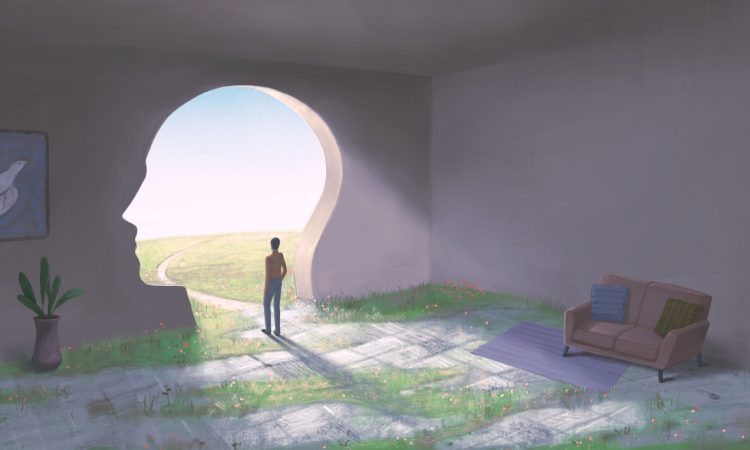COVID-19 is more than a horrible illness. It turned things on their heads. It showed us things about ourselves we didn’t want to see. It lifted a rock and one of the things that crawled into the open was mental illness. We knew it existed and peeked under that rock on occasion, then carefully placed it back, leaving mental illness stigmatized and more or less out of the mainstream.
But then COVID came into our lives and that changed. Mental illness, mental stress, mental wellness and mental health worked their way into our conversations. Mental illness was no longer assumed to belong to those we turned our eyes from. Mental illness came into our homes. We learned that our neighbours, friends, co-workers, family members, teachers, students, clergy, health-care practitioners and others we encountered every day identified as having mental health struggles – some episodic, some isolated one-time events, some chronic. We discovered that that which had remained unspoken was becoming present in our everyday lives.
For those of us who have a mental illness diagnosis, it had always been a well-kept secret. We didn’t speak of it. We felt the stigma, the quiet judgment and the slight yet perceptible change in interaction if we shared. We took our medication, saw our counsellors and doctors, and managed as best we could assuming we were the only one … until COVID forced us to move that rock. The widespread trauma, the fear, the unknown, the emotional/mental feelings of navigating this pandemic brought our mental health into the light. Discussions about how we were managing mentally were as prevalent as how we were managing physically. Mental illness discussion become part of the fabric of our communities.
With mental health, illness, episodes and stress becoming more openly discussed, it also became part of the fabric of career development and counselling. Our clients are more open about their anxiety, depression and other diagnoses as we work with them. It is more woven into the work we do together than ever before. And it has also opened the door for practitioners such as myself to disclose and share a lifelong involvement and diagnosis, further connecting us as we walk the path of career development together.
“Discussions about how we were managing mentally were as prevalent as how we were managing physically. Mental illness discussion become part of the fabric of our communities.”
This new openness has changed our work, in some cases subtly and in some cases greatly. In accordance, we need to change. We need to learn more about mental illness and how it impacts our clients. How does anxiety impact the interview process? How does someone manage their fear when re-entering the job force? How does someone with a chronic mental illness transfer from a locked-down lifestyle to being in public again? How does someone with insomnia brought on by their medications for their illness manage the shift from being up all night to up all day? These things need addressed as part of career counselling.
We also need to investigate best practices for disclosure and accommodation. How and when does someone share their illness and how do they manage the fear of doing so? We need to educate employers about inclusive hiring practices and supporting employees’ mental health. We need to open dialogues and understandings where often none existed prior. And we can do this. Supporting each other, engaging in dialogue and connecting with those with lived experience will help us navigate these new waters to support our clients.
As a person who has worked for over 20 years as a career practitioner and manager and has a lifelong mental health diagnosis, this budding openness brings me joy. We can keep the rock lifted, embrace these conversations initiated by a pandemic that brought this important topic to the light and continue to share and support each other. This is a new step in our work as career counsellors, and together we can grow and manage this change to help eliminate the stigma of this disease.





Nikki, I love your advocacy for sharing lived experience with clients. As professionals, while we understand it’s not wise to tell a client “I know how you feel”, showing vulnerability and “being real” can be what a client needs to move forward. It shows them they are not alone, and shines a light on what for many can be a dark, secret place.